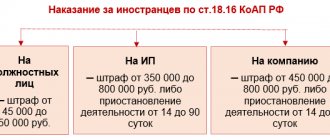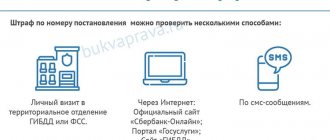The methodology for calculating fines and penalties imposed for violation of government contracts is specified in the “Rules for determining the amount of fines assessed for improper performance of contractual obligations.”
Violation of contractual obligations always infringes on the interests of a bona fide counterparty, but if this concerns government procurement, then in the end ordinary citizens act as the injured party. For this reason, the legislator stipulates separately the methods for calculating penalties and interest imposed for violation of government contracts. Today, the calculation of fines and penalties is carried out in accordance with the “Rules for determining the amount of penalties that are assessed for improper fulfillment of contractual obligations (with the exception of late fulfillment of obligations, as well as the amount of penalties accrued for each day of delay in obligations).”
Let's look at examples of how the amount of the penalty is determined and how to write down a section regarding the responsibility of the parties to the transaction in a government contract.
Penalty calculator
Customer's responsibility
The amount of penalties collected in case of delay in fulfilling the customer’s obligations is not regulated by the Rules, so you need to focus directly on the norms of Law No. 44 “On the contract system...”. Article 34 (Part 5) of this Law defines the amount of the penalty as 1/300 of the Central Bank refinancing rate for each day of delay from the amount not paid on time (starting from the day following the expiration of the contractual obligation). From January 1, 2016, the refinancing rate is equal to the key rate.
For example, with a contract price of 500 thousand rubles, the date of the last transfer of payment to the supplier is March 20, but in fact the funds were transferred in full on March 31. In this case, the calculation of the penalty for the full period will look like this:
- 500 thousand rubles x (11% x 1/300) x 11 (number of days from March 21 to March 31) = 2021.67 rubles.
Let’s say that only 200 thousand rubles were transferred on time, but the remaining 300 thousand rubles were overdue. In this case, the calculation will be as follows:
- 300 thousand rubles x (11% x 1/300) x 11 (number of days from March 21 to March 31) = 1210.00 rubles.
The amount of the fine cannot be changed by agreement of the parties, since Law No. 44 (Article 34, Part 5) does not provide for such a possibility.
The amount of fines for other violations of the contract committed by the customer (except for delay) should be set as a fixed amount directly in the contract. Moreover, the Rules strictly regulate the amount of penalties depending on the contract price (clause 5 of the Rules).
The amount of the fine that is collected from the customer in case of improper performance of his duties under a government contract, table No. 1.
| № | Price | Amount of the fine (as a percentage of the contract price) |
| 1. | No more than 3 million rubles | 2,5 |
| 2. | 3-50 million rubles | 2 |
| 3. | 50-100 million rubles | 1,5 |
| 4. | More than 100 million rubles | 0,5 |
The scale of the contract price is not entirely correctly formulated, so the question arises: what size of the fine should be prescribed if the contract price is, for example, exactly 50 million rubles. However, in this case it is not difficult to predict the customer’s behavior: the contract will most likely provide for a smaller fine. A similar situation also arises in the case of determining the amount of penalties for the supplier.
You might also be interested in:
- Online calculator for the cost of a bank guarantee We suggest using our service to compare the cost of bank guarantees in different banks.
- Educational program on participation in procurement
Those who are participating in government procurement for the first time need to know a lot: where to start preparing, who the customers are, how to look for the best procurement, how to submit an application, what financial support is. - How to win an auction under Federal Law 44 “On the contract system...”
We have prepared instructions that include five steps. Study it and you will definitely win.
When the collection of a penalty will be challenged in court
The issue of applying penalties to the contractor for violating the terms of the contract also depends on the degree of guilt of the contractor. Sanctions may be reduced or not applied at all if the following circumstances occur:
- Force Majeure;
- the breach of contract was due to the fault of the customer.
The above circumstances must be provided for in the content of the contract, but if they are not specified, then this is considered a violation for which the Federal Antimonopoly Service of Russia has the right to hold the customer accountable (Decision of the Supreme Court of the Russian Federation dated April 25, 2016 No. 309-KG16-2910 in the case No. A76-7702/2015).
When the issue of collecting a penalty under 44-FZ for improper execution of a government contract is referred to the court, then by its decision the contractor may be released in whole or in part from paying the sanction. As an example, we can cite the following cases considered by arbitration courts:
- The customer untimely provided the contractor with the initial data and technical specifications, in accordance with which documentation on the planning of the territory should be developed, and therefore the contractor was unable to complete the work on time. The court found the customer guilty in this fact and decided that the sanctions should be applied in part (Resolution of the Arbitration Court of the East Siberian District dated November 9, 2015 No. F02-5932/2015 in case No. A33-22269/2014).
- The draft contract stipulated that within two months from the date of signing the contract, the contractor is obliged to provide design and estimate documentation, having previously carried out its state examination. The court qualified the establishment of such a time frame by the customer for this stage as an abuse, since in accordance with the regulatory framework, the state examination of such documents takes 60 working days. These conclusions became the basis for releasing the contractor from paying the penalty (Resolution of the Arbitration Court of the Far Eastern District dated January 30, 2017 No. F03-6209/2016 in case No. A73-8100/2016).
- The contract was signed late due to the fault of the customer, and therefore, by a court decision, the collection of penalties under 4-FZ from the contractor was canceled (Resolution of the Arbitration Court of the Far Eastern District dated July 4, 2016 No. F03-2753/2016 in case No. A37-1224/2015 ).
- The contractor failed to properly perform the work under the contract because the cost had increased significantly. The contractor promptly informed the customer about this fact, but there was no reaction. The court found the customer guilty of ignoring the increase in the price of the work and made a decision to partially recover the penalty under 44-FZ (Resolution of the Arbitration Court of the West Siberian District dated November 14, 2016 No. F04-4990/2016 in case No. A70-253/2016);
- The customer delayed the stage of approval of the preliminary design, adjusted the design task several times, as a result of which the parameters of the designed object changed significantly. It was these circumstances that the court recognized as the reason for the non-fulfillment of the contract and canceled the collection of a penalty under 44-FZ from the contractor (Resolution of the Arbitration Court of the West Siberian District dated October 27, 2016 No. F04-5061/2016 in case No. A70-918/2016).
- The contractor was unable to meet the deadlines because the customer belatedly provided the construction site at his disposal. The court saw in this fact the partial fault of the customer, and therefore the recovery of the penalty was carried out in a partial amount (Resolution of the Arbitration Court of the Moscow District dated 02/08/2017 No. F05-20908/2016 in case No. A40-199307/15).
In order for the contractor to defend his rights in court, it is necessary to collect evidence of the customer’s guilt in violating the terms of the contract. It should be noted that this matter is not as simple as it might seem at first glance. In this matter, it is worth using the services of professional lawyers who will provide the necessary evidence and develop defense tactics.
Responsibility arising from the supplier (contractor, performer)
For suppliers who are late in fulfilling the contract, the calculation of penalties is carried out according to a more complex scheme compared to the calculation of penalties for unscrupulous customers. In general, the formula for determining the amount of the penalty can be presented as follows (clause 6 of the Rules):
P = C x (C – B) , where:
- P is the contract price;
- B is the cost of a contractual obligation fulfilled on time (determined on the basis of documents evidencing the acceptance of goods, provision of services, performance of work, including the execution of individual stages of contracts);
- C is the bet size.
If there are no issues with components B and C, then rate (C) is calculated in several stages. The formula determining the size of the bet is itself simple (clause 7 of the Rules): C = DP x SCB , where:
- DP is the number of days overdue;
- SSP is the established amount of the refinancing rate in effect at the time of payment of the penalty, which is determined taking into account the coefficient K.
Coefficient K, which depends on how serious the delay was made by the supplier, is also easy to calculate (clause 8 of the Rules):
K = (DP/DC) x 100% , where:
- DC is the period for fulfilling the contractual obligation (number of days);
- DP is the number of days overdue.
At the next stage, the amount by which the refinancing rate must be multiplied to obtain the SSB is determined (this indicator is determined based on the size of the coefficient K) (clause 8 of the Rules).
Rules for finding the coefficient by which to multiply the refinancing rate, depending on the K coefficient, table No. 2
| № | Factor K | Refinancing rate (RSR) |
| 1. | 0-50% | 0.01 of the refinancing rate level |
| 2. | 50-100% | 0.02 from the refinancing rate level |
| 3. | 100% and more | 0.03 from the refinancing rate level |
Here we again see an incorrect definition of the scale ranges: for example, it is not clear how to calculate the rate at the K coefficient, which is equal to 50%. Probably, over time, the scale of this coefficient will be brought into a more familiar form: from 0 to 49%, from 50 to 99%, as well as 100% and more.
Let's calculate the size of the penalty using examples.
Example one
The price of the contract is 500 thousand rubles, its execution period is 30 days, the delay is 9 days, the contract was not executed within the agreed period.
First we determine the coefficient (K):
K = 100% x (9 / 30) = 30%
Since this value falls in the range “from 0 to 50%”, when calculating the rate (C), the SSP will be used, which is equal to 0.01 of the refinancing rate level (11.0%).
C = (0.11 x 0.01) x 9 = 0.0099 (0.99%)
Now we move on to calculating the penalty (our value B is zero, since the contract has not been fulfilled even partially):
P = (500 thousand rubles – 0 rubles) x 0.99% = 4950.00 rubles
Having imagined that the supplier has partially fulfilled the contract, when calculating the penalty, you need to take into account the amount of the performed part. For example, the acceptance certificate indicates the executed contract value of 200,000 rubles:
P = (500 thousand rubles – 200 thousand rubles) x 0.99% = 2970.00 rubles
Example two
Let’s imagine that all the data is the same (the contract price is 500 thousand rubles, the contract period is 30 days, and there is no partial fulfillment), the delay is 18 days. Again, we start by calculating the K coefficient:
K = (18 / 30) x 100% = 60%
Of course, the K coefficient automatically changes, which must be taken into account, since it corresponds to the range “from 50% to 100%”, therefore, the refinancing rate (11.0%) is multiplied by 0.02:
C = 18 x (0.11 x 0.02) = 0.0396 (3.96%)
Compared to the first example, the final rate used to calculate the penalty has increased significantly, and the amount of the penalty has increased:
P = (500 thousand rubles – 0 rubles) x 3.96% = 19800 rubles
Example three
Finally, we will calculate penalties in case of serious delay in fulfilling contractual obligations that completely exceed the deadline for their fulfillment, for example, by 42 days:
K = (42 / 30) x 100% = 140%
The range of K coefficient values changes again. Now its value is “100% or more,” which means the refinancing rate (11.0%) must be multiplied by a factor of 0.03:
C = (0.11 x 0.03) x 42 = 0.1386 (13.86%)
The final penalty amount will be:
P = (500 thousand rubles – 0 rubles) x 13.86% = 69.3 thousand rubles
Read this article about how to reduce accrued penalties.
For suppliers, there are also fines applied for any improper fulfillment of obligations, excluding delay.
Amounts of penalties that are collected from a supplier (contractor, performer) in case of improper fulfillment of obligations under a government contract (Rules, paragraph 4), table No. 3
| № | Contract price | Amount of penalties (in % of the contract price) |
| 1. | No more than 3 million rubles | 10,0 |
| 2. | 3-50 million rubles | 5,0 |
| 3. | 50-100 million rubles | 1,0 |
| 4. | More than 100 million rubles | 0,5 |
Compared to the amount of delay, the amount of penalties is more impressive, which can adversely affect the fulfillment of contractual obligations. For example, if the contract expires and the contractor fails to complete the work efficiently, then it makes no sense to deliver it unfinished: it is significantly “cheaper” to fulfill the contract by allowing a delay. If in such a case a poor-quality work result is delivered, the supplier will be forced to pay a fine and correct the existing deficiencies. This will lead to the following situation: the work will be completed efficiently after the deadline for fulfilling contractual obligations has expired, therefore, the customer will also be able to collect a late fee, because Law No. 44 and the Rules do not contain a direct prohibition on this.
Suppliers will begin to be fined for false information
On December 15, 2020, draft amendments to the Code of Administrative Offenses of the Russian Federation (CAO) No. 1075609-7 were published on the State Duma website. They plan to establish liability for the transfer of false information by participants in public procurement.
The bill states that if a potential supplier provides inaccurate data in an application or documents that confirm compliance with additional requirements, or the winner provides inaccurate information when concluding or fulfilling obligations under a government contract, then the official and individual entrepreneur will receive a fine in the amount of 20,000 to 50,000 rubles , and a legal entity for such actions will be fined from 100,000 to 300,000 rubles.
IMPORTANT!
They will not be held administratively liable if such actions constitute a criminal offense. In this case, criminal prosecution will follow.
For sending an application with knowingly false information about the proposed product, including about goods that are supplied during the performance of work, provision of services, officials and individual entrepreneurs will be fined in the amount of 10,000 to 30,000 rubles, and a legal entity will pay a fine of 50,000 up to 200,000 rubles.
To implement the amendments, a new article 7.30.1 “Provision of false documents (copies thereof) and information in the procurement of goods (works, services) for state and municipal needs” will be added to the Administrative Code. The initiators of the innovations emphasize that the purpose of introducing new fines is to minimize the participation of contractors with false documents, increase efficiency in spending budget money and help create a level playing field for competition.
On December 23, 2020, the bill was returned to the subject of the right of legislative initiative due to non-compliance with the requirements of the State Duma regulations. We assume that the violations will be eliminated and submitted to parliament according to the rules again.
ConsultantPlus experts analyzed what kind of liability procurement participants face now. Use these instructions for free.
Completely unconscionable
The rules do not define how penalties are established for failure to fulfill obligations (here we mean only improper performance of the contract or delay in its performance).
When adopting Law No. 44 (in its original version), the legislator did not mention liability arising in the event of non-fulfillment of the contract. Amendments to Law No. 44 (parts 5, 6 and article 34 of the part were introduced only at the end of 2013. As a result, these rules provide that the fine imposed for improper performance or non-fulfillment of contractual obligations must be fixed in the contract as a fixed amount, determined taking into account the Rules However, the Rules themselves only speak about delay or improper fulfillment of obligations. It is clear that in case of failure to fulfill contractual obligations, it is the enforcement of the contract that guarantees the interests of the customer, for example, payment under a bank guarantee (Law No. 44, Article 45), while the supplier will be entered into the register unscrupulous suppliers (Law No. 44, Article 104).
Amendments to Law No. 44 (parts 5, 6 and article 34 of the part were introduced only at the end of 2013. As a result, these rules provide that the fine imposed for improper performance or non-fulfillment of contractual obligations must be fixed in the contract as a fixed amount, determined taking into account the Rules However, the Rules themselves only speak about delay or improper fulfillment of obligations. It is clear that in case of failure to fulfill contractual obligations, it is the enforcement of the contract that guarantees the interests of the customer, for example, payment under a bank guarantee (Law No. 44, Article 45), while the supplier will be entered into the register unscrupulous suppliers (Law No. 44, Article 104).
Question: “Is it necessary to make changes to the current contract, which was concluded in 2013 for 2014, regarding the amount of the penalty due to the adoption of new rules?”
The customer is obliged to specify in the draft contract the responsibility in case of non-fulfillment in the form of a fixed amount of penalties (Law No. 44, Article 34, Part 4). The simplest thing that can be done in such a situation in order to prevent claims from the FAS of the Russian Federation is to change the wording of the contract so that a fixed amount of penalties applies to “improper performance or failure to fulfill obligations under the contract.”
How long does it take to consider a claim?
The addressee who receives the claim is obliged to consider it and respond within the time period established in the contract.
If such a period is not established in the contract, then in some cases the terms are determined by law, for example, 10 calendar days are set for the policyholder’s response to a claim under compulsory motor liability insurance in accordance with the Law on Compulsory Motor Liability Insurance or 30 calendar days for claims for unjust enrichment in accordance with Part .5 Article 4 of the Arbitration Procedure Code of the Russian Federation.
In similar situations, we calculate the deadlines by analogy with established legislation, otherwise it is necessary to respond within a reasonable time (clause 2 of Article 314 of the Civil Code of the Russian Federation).
Conditions of Uncertainty
The law exempts a party from paying a penalty (penalty, fine) if it proves that improper performance or failure to fulfill an obligation provided for in the contract was due to the fault of the other party or due to force majeure (Law No. 44, Article 34, Part 9).
The fixed amount of the fine should be calculated already at the stage of developing tender documentation. Note that this is difficult to do, since the final contract price, on the basis of which the fine is calculated, will be known only after the winner of the competition is determined. For this reason, a clause containing blank fields can be included in the contract, for example: “For improper performance or non-fulfillment of the terms of the Contract, the Supplier must pay the Customer penalties, the amount of which is ____% of the contract price defined in clause ____ of the Contract (this amounts to ____ rubles)".
At the stage of concluding a contract, the corresponding values must be entered in the empty fields. If the customer is confident that the initial price based on the results of the government procurement will not decrease to such a level as to fall into a different range, a specific percentage can be immediately indicated (for example, in the procurement documentation the contract price is 3.5 million rubles, and according to the results of the competition the winner is recognized participant who offered 2.9 million rubles).
Note that according to Law No. 44, the amount of the penalty must be specified in the contract (Article 34, Part 7). Obviously, in this case, the provisions of the Rules can simply be duplicated.
Exceptions to the rules
It is worth recalling that according to Law No. 44 (Article 34, Part 15), the customer has the right not to fulfill the requirement regarding the mandatory stipulation in the contract of the amounts of penalties and penalties if the purchase is carried out from a single supplier:
- for an amount that does not exceed 100 thousand rubles (Law No. 44, Article 93, Part 1, Clause 4);
- to conclude an agreement to visit a theatre, zoo, concert, cinema, museum, circus, sporting event or exhibition (Law No. 44, Article 93, Part 1, Clause 15);
- if medicines are purchased (Law No. 44, Article 93, Part 1, Clause 28).
Tags : penalties, fines, 44-FZ, calculation example,
08 April 2016
Number of views: 25376
Please rate how useful this material was.
Rating: 0/5 — 0 votes
Similar articles:
- Regulations have been approved for checking delivered goods using both video and photographic equipment for compliance with information under the contract (166)
- Court: in the notice of public procurement, information can be indicated in the form of a reference to documentation (146)
- FAS RF: when conducting a repeat procurement in the field of construction, the participant will only need to submit “consent” to participate (134)
Comments ()
- Sergey May 03, 2021, 12:26 0
Tell me, if the contract went into the red during an electronic auction (offer for the right to conclude a contract), what amount of the fine according to Government Resolution 1063 should the customer write in the contract?answer
- Semyon 03 May 2021, 14:47 0
Hello, Sergey! In this case, we also recommend that you follow the methodology for calculating fines and penalties imposed for violation of government contracts, which is specified in the “Rules for determining the amount of fines assessed for improper fulfillment of contractual obligations” - i.e. depending on the proposed contract price, even if it is for an increase. In this case, you can also refer to paragraphs 3 - 5 of these Rules.
answer
- Yulia April 13, 2021, 04:31 pm 0
Tell me, according to the contract (where the customer is a budget organization), the supplier was late in delivering the machine. The customer compiled and sent a claim where the amount of the penalty was incorrectly calculated, how can the customer correct the error?
answer
- Effective technologies April 13, 2021, 16:41 0
Julia, hello! If you are interested as a customer, we recommend that you send a second letter to the supplier, in which you indicate that in the previous letter dated No.___ of such and such a date, an error (typo) was made, and ask to pay penalties in the amount indicated below + attach the correct calculation. Or you can wait for the Supplier’s response, in which he himself will point out the mistakes made. But if you then go to court for collection in the absence of voluntary payment, then you need to act according to the first option, since the supplier may not answer you. If you are a supplier, draw up your calculation of the penalty, in which you indicate the mistakes made, and send it to the customer.
answer
How to challenge a punishment
Violations in the customer’s work are usually identified by FAS or prosecutors during inspections. Then the antimonopoly authority initiates a case of an administrative violation, considers it and imposes a fine on the customer or his employees. At the same time, they will not be held accountable if the violation is discovered 1 year after its commission.
The punishment can be challenged in court. This should be done precisely in three cases:
- If the fine was imposed illegally, the statute of limitations has expired, the employee is not guilty, etc.
- If the procedure for bringing to administrative responsibility is violated, the protocol on bringing to administrative responsibility was drawn up incorrectly, the accused was not notified of the fine or the time of its consideration in court.
- If the customer fails to fulfill his obligations under the contract due to force majeure or the fault of the supplier. These mitigating conditions are prescribed in Part 9 of Art. 34 44-FZ.
When going to court, the customer can refer to the fact that 44-FZ has been violated for the first time or the violation is minor. There are examples in judicial practice when, in the first case, the court reduced the amount of the fine, and in the second, it canceled the punishment altogether.
A decision on an administrative offense must be challenged within 10 days from the date of its receipt. After this, the resolution will come into force.








